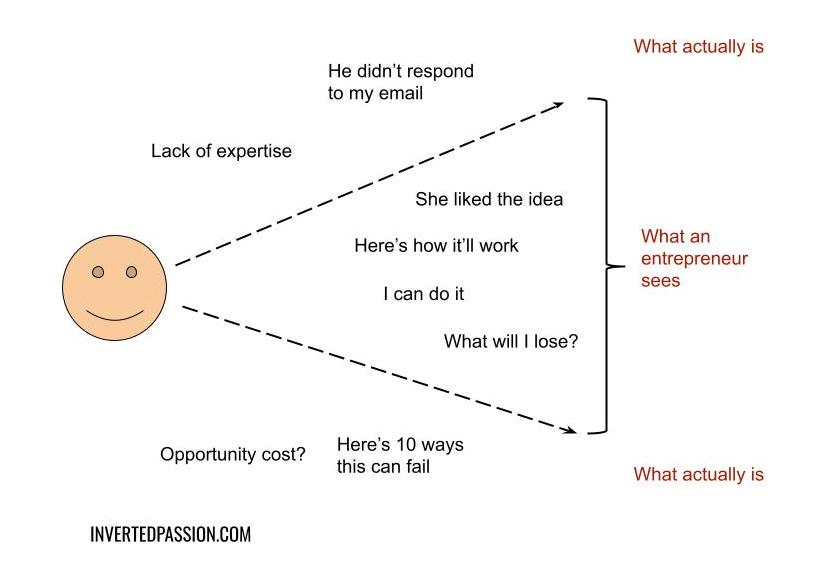Thinking is expensive for an animal – our brain consumes almost 20% of the energy of the body (even at rest). Hence, the brain takes whatever shortcuts it can to do less deliberate thinking (that requires more energy) and more automatic thinking (that requires less energy).
There’s another name for such automatic thinking: cognitive bias.

The word bias is used because our preprogrammed ways of thinking bias us towards paying more attention to certain information at the expense of ignoring other information. So, cognitive biases are systematic errors in viewing of the world. They are very hard to correct because you literally see the world through a lens that’s painted with cognitive biases.
For example, take a look at the following image:
What if I tell you that both monsters are of equal sizes? Unless you’ve seen this illusion before, this information is likely a surprise to you because “obviously, one is bigger than the other”. But that isn’t so. Measure both monsters with a scale, and you’ll know.
The reason one monster appears much larger than the other is because our brain takes shortcuts. It is taking cues from the perspectival depth in the image to conclude relative size. This shortcut works really well in reality like when seeing mountains at a distance, but like in the image above, it can backfire too.
Particularly relevant to entrepreneurs are two cognitive biases: confirmation bias and confidence bias. They exist because our brain tries to explain our intuitive choices by selectively filtering out views and evidence that are contrary to our existing beliefs.
Confirmation bias leads one to overweight information that aligns to her beliefs while underweighting disconfirmatory information. And confidence bias leads one to overestimating her abilities while ignoring the weak areas. These biases help us make important decisions since, if we’ll always remain doubtful of our beliefs, we may never be able to decide. Since we can’t survive without taking decisions, these biases evolved to reduce doubt.
Even though confidence is a necessary ingredient in entrepreneurial ventures, it’s also the major reason for failure. Because of confirmation bias, entrepreneurs select all the positive evidence towards their idea and because of confidence bias, they overweight their ability to execute on that idea (while underweighting risks or opportunity costs). Taking informed risk is great but taking blind risk is not.
This is why an entrepreneur must consciously strive to expand his perspective to include disconfirmatory evidence. This can be done by asking or thinking about specific ways in which an idea can fail, or by making a “pros-and-cons” list. Many successful entrepreneurs spend disproportionately more time focusing specifically on potential reasons for failure because they know their mind will automatically rush to potential reasons for success. The “pros” of an idea come easily and naturally, and that is why the focus should be to find the “cons”. So, as a rule, an entrepreneur must always list evidence and reasons for potential failure (including an honest assessment of one’s risks and opportunity costs).
Cognitive biases are a double-edged sword because the confidence that you get from believing that your idea will work is needed to make it work. The decoupling of entrepreneurial energy and knowledge of reality of one’s ideas and abilities is rare.
Remember: overconfidence gives energy, but also lets people spend years solving make-believe problems that nobody has. Be skeptical. Whenever you’re feeling too excited about something, always seek disconfirmatory evidence.
This essay is part of my book on mental models for startup founders.
Join 200k followers
Follow @paraschopra